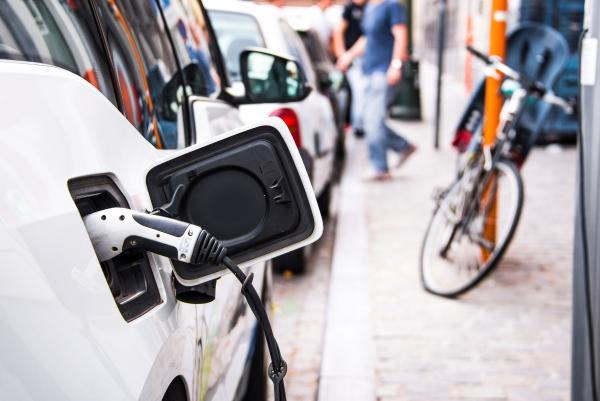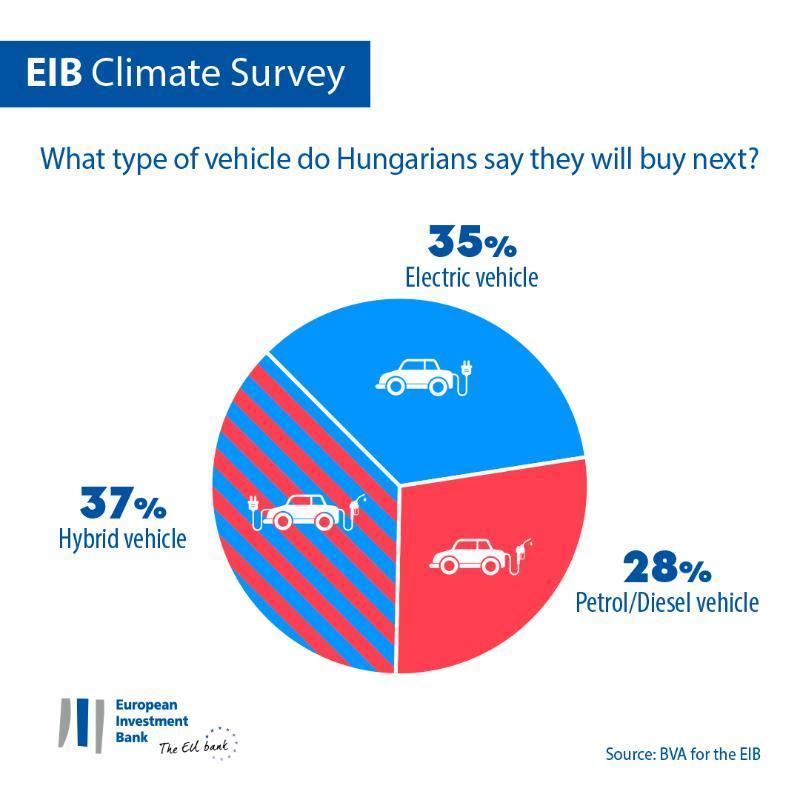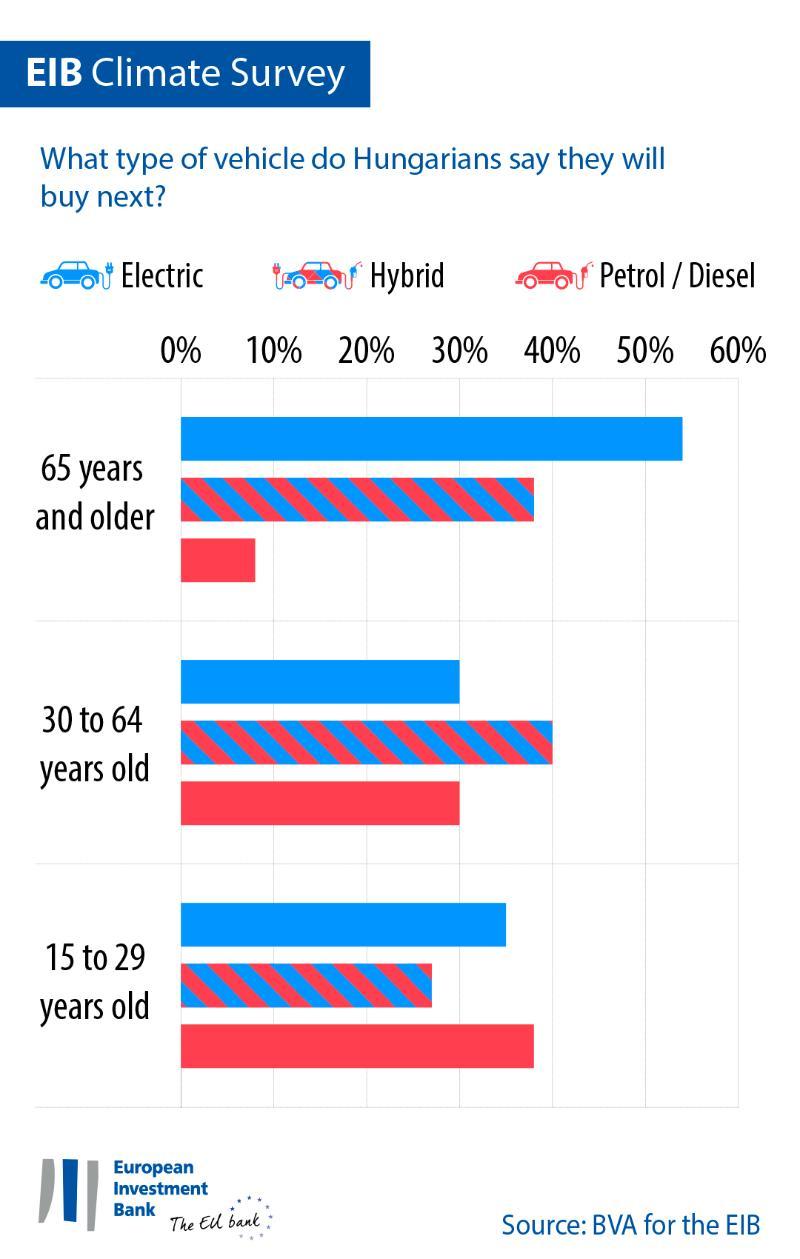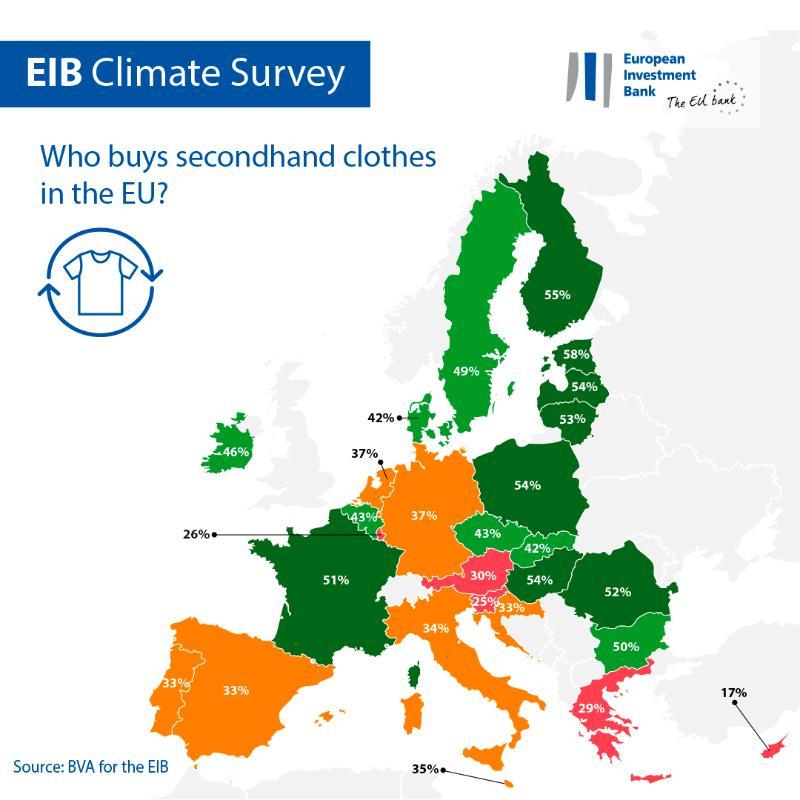
The second part of the 2021-2022 EIB Climate Survey explores people’s views on climate change in a rapidly changing world. The results from this release focus on citizens’ individual behaviour and the actions they are taking to combat climate change.
- 79% of Hungarians feel they are doing all they can to fight climate change in their daily lives, but the majority believe that their compatriots are not doing the same
- 72% of Hungarian car buyers say they would pick either a hybrid or electric car the next time they purchase a vehicle, while 28% would still opt for a petrol or diesel car
- 68% of Hungarians say they consider climate change when choosing a holiday destination
- 58% of young Hungarians consider climate change when looking for a job
- 55% of young Hungarians already buy second-hand clothes instead of new ones
These are some of the results from the second release of the 2021-2022 Climate Survey published today by the European Investment Bank (EIB). The EIB is the lending arm of the European Union and the world’s largest multilateral lender for climate action projects.
Hybrid or electric cars more sought after than petrol or diesel vehicles
When asked about future car purchases, 72% of Hungarian car buyers say they would choose either a hybrid or electric car. This figure is 44 points higher than the percentage of Hungarians who said they would buy a diesel or petrol vehicle (28%). More specifically, 37% would purchase a hybrid vehicle and 35% would opt for an electric vehicle.

Hungarian car buyers aged 65 and older are particularly interested in purchasing an electric vehicle (54%), while young respondents are more likely to choose a petrol or diesel vehicle (38%). This figure is 30 points above the figure for car buyers older than 65 (only 8% of them say they would buy a petrol or diesel vehicle). Hybrid vehicles would be the top choice for Hungarians aged 30-64: 40% would opt for a hybrid car, 13 points above the figure for people younger than 30 (27%).

Meanwhile, 22% of the overall Hungarian population say they do not have a vehicle now and are not planning to buy one (nine points above the EU average).
With 72% of Hungarian car buyers saying they would opt for a hybrid or electric vehicle, Hungarians seem as inclined to switch to new car technologies as Croatians (73%) and Poles (73%), but more inclined to do so compared to Austrians (51%) and Czech respondents (48%).
More specifically, Hungarian car buyers seem most inclined to choose a hybrid car for their next vehicle, with 37% of them stating their next car will have this type of engine, similar to Croatians (36%). Hungarians seem more inclined to opt for a hybrid than Czech people (31%) and Austrians (28%) are. However, Hungarians appear to be less inclined to choose a hybrid compared to Poles (46%).
Hungarian car buyers seem to be as inclined to purchase an electric car (35%) as Croatians (37%). Meanwhile, Eastern Europeans[1] on average (30%), Polish car buyers (27%), Austrians (23%) and notably Czechs (17%) appear to find electric cars less attractive.
In general, European car buyers tend to favour hybrid vehicles (39%), while petrol or diesel vehicles are ranked second (33%) and electric cars come third (28% state they would purchase an electric car). While Chinese car buyers are the most inclined to buy an electric car (44%), Americans would opt first for a hybrid vehicle (38%), followed by a petrol or diesel vehicle (33%), then an electric car (29%).

Climate protection versus flying for holidays
68% of Hungarians say they consider climate change when choosing their holiday destination. This concern is even stronger amongst people younger than 30 (70%) . However, a more than one-third of young people (34%, compared to 17% for people aged 30-64 and 9% for people aged 65 and above) say they will fly for their summer holidays in 2022. More than one-fifth of them (22%, compared to 9% for people aged 30-64 and 5% for people aged 65 and above) say they will fly to a faraway destination.
Shopping for clothes, choosing a job, deciding on a bank: how climate considerations affect people’s decisions
54% of Hungarians say they buy second-hand clothes instead of new ones (12 points above the EU average). Women are more likely to do so than men (59% for women vs. 47% for men).

49% of Hungarian people consider climate change when searching for a job. This is particularly the case for 15-29 year-olds: 58% of them take climate change into consideration when job hunting, compared to 48% for people aged 30-64 (10 points lower).
Overall, 53% of Hungarians consider climate change when they choose their bank or invest their savings.
EIB Vice-President Teresa Czerwińska said: “Despite some clear generational gaps, Hungarian people are increasingly adapting their mobility and consumption habits in a more sustainable manner to tackle climate change. These shifts in individual behaviour show that people of all ages are willing to make stronger commitments in their daily lives to help mitigate the climate crisis. These intentions were voiced during COP26 and are a clear indicator of support for our efforts to foster the green transition. Hungary was the first EU Member State to ratify the Paris Agreement and the fact that its citizens are also ready to act is a sign of their understanding of the importance of climate action for the safe and sustainable future of our planet. As the EU climate bank, one of the EIB’s key roles is to finance innovative projects that focus on electric mobility as well as other sustainable mobility solutions that help build a decarbonised future for all.”
Download the Excel spreadsheet with the raw data for all 30 countries surveyed here. Please click here to access an EIB webpage presenting key findings of the EIB Climate Survey IV.
Background information
About the EIB Climate Survey
The European Investment Bank has launched the fourth edition of the EIB Climate Survey, a thorough assessment of how people feel about climate change. Conducted in partnership with market research firm BVA, the fourth edition of the EIB Climate Survey aims to inform the broader debate on attitudes and expectations in terms of climate action. More than 30 000 respondents participated in the survey between 26 August and 22 September 2021, with a representative panel for each of the 30 countries polled.
About the European Investment Bank
The European Investment Bank (EIB) is the long-term lending institution of the European Union and is owned by the EU Member States. It makes long-term finance available for sound investment in order to contribute towards EU policy goals both in Europe and beyond. The European Investment Bank is active in around 160 countries and is the world’s largest multilateral lender for climate action projects. The EIB Group has recently adopted its Climate Bank Roadmap to deliver on its ambitious agenda to support €1 trillion of climate action and environmental sustainability investments in the decade to 2030 and to deliver more than 50% of EIB finance for climate action and environmental sustainability by 2025. As part of the roadmap, all new EIB Group operations have been aligned with the goals and principles of the Paris Agreement since the start of 2021.
About BVA
BVA is an opinion research and consulting firm recognised as one of the most innovative market research firms in its sector. Specialised in behavioural marketing, BVA combines data science and social science to make data inspiring and bring it to life. BVA is also a member of the Worldwide Independent Network of Market Research (WIN), a global network of some of the world’s leading market research and survey players, with over 40 members.
[1] These Eastern European countries include Bulgaria, Croatia, Czech Republic, Estonia, Hungary, Latvia, Lithuania, Poland, Romania, Slovakia and Slovenia